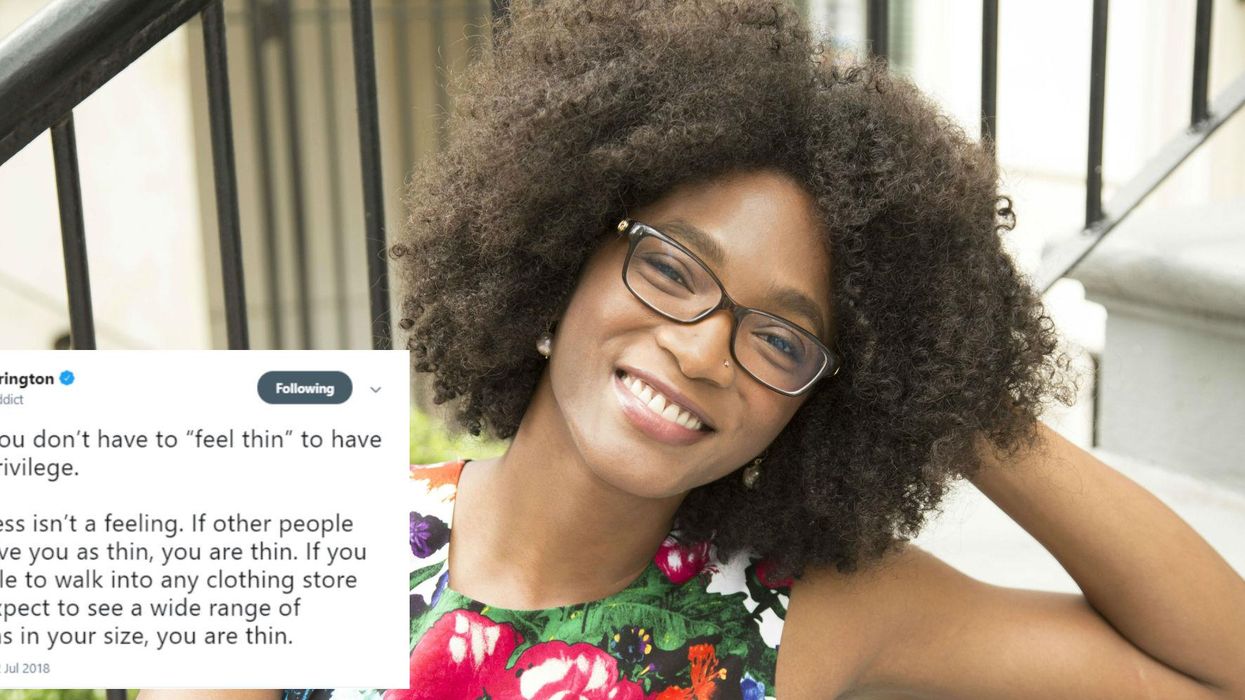News
Jake Hall
Jul 23, 2018

Photo: Cora Harrington, by Nomi Ellenson / Screenshot: Twitter / @lingerie_addict
The last few days have seen an eruption of debates surrounding body image on social media.
The initial catalyst for this increase in conversation was Insatiable, a new Netflix series whose premise is seemingly simple: a fat woman (played by a thin woman in a fat suit, of course) is bullied for her weight, then suffers a horrific accident and has her jaw wired shut.
During this time she can’t eat, so returns with a slimmed-down body and an insatiable (get it?) appetite for revenge – which she can now achieve, because she’s thin!
Activists have since launched a petition for the show’s release to be cancelled, but plenty of social media users remain confused about the controversy, as well as the outrage from body-positive activists.
Luckily, writer Cora Harrington – who runs a successful website, The Lingerie Addict, and is scheduled to release a new book, In Intimate Detail, next month – stepped in to clarify a few misconceptions, namely the concept of ‘thin privilege’ and how it can be applicable to people who don’t necessarily ‘feel’ thin.
Harrington is well-versed in these subjects, and has previously spoken to indy100 about the lingerie industry and its overall lack of diversity.
Throughout the thread, she references a series of ongoing issues – the seemingly endless conversations around a lack of interesting plus-size ranges on the high street, for example, or the continuous prevalence of fat-shaming which, for the record, doesn't work and actually comes with a string of insidious effects.
As well as making reference to the various news stories written about fat women in particular being shamed on aeroplanes, Harrington also calls out the notion that the body-positivity is still truly ‘radical’ by highlighting the fact that many of its figureheads are still closely aligned with conventional beauty standards.
Plenty of fashion brands have also made a habit of promoting ‘body-positivity’ without ever casting models whose bodies don’t fit a size 14/16.
Writer Bethany Rutter, author of genuinely inclusive street style Bible Plus+ and social media manager at plus-size label navabi fashion, has also eloquently summarised these problems in past articles.
To wrap up these points, Harrington writes a concise, much-needed definition of ‘thin privilege’: “All ‘thin privilege’ means is that your life isn’t made more difficult because of your weight.”
The replies were filled with a series of users who made valid points about having to get their clothing altered, or about insecurities related to their weight.
Naturally, being thin doesn’t eradicate these problems automatically, but it does mean that the world is predominantly designed to accommodate your body, as many other users pointed out.
The division in opinion made evident throughout the replies highlights that there's still work to be done in terms of fleshing out these debates, but Harrington's words seemingly confirm the idea that people get seriously offended when they're accused of having 'privilege' of any description.
The term doesn't imply an inherently cushy life, nor is it designed to negate the genuine struggles of people that might not fit into any 'minority' category; instead, it simply shows that the world more readily caters to some people than it does to others. Privilege as a concept isn't about feelings, or an example of 'Oppression Olympics'; it's about highlighting the tiny acts of aggression or discrimination that plenty of people experience on a daily basis.
Ultimately, as the body-shaming debate rages on, Harrington's words are a handy guide to empathising with people whose identities differ from your own.
More: A plus-size model who has graced the pages of Vogue says she is constantly fat-shamed
Top 100
The Conversation (0)













